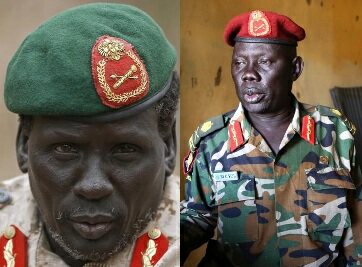S. Sudan split over US sanctions on top rival military officers
May 7, 2014 (JUBA) – South Sudan is sharply divided over sanctions imposed by the United States government on two senior military officers believed to have played a critical role in the county’s crisis, which has claimed thousands of lives.

Under the sanctions, both Mangok and Gadet are banned from travelling to the US and any assets they have in US financial institutions will be frozen.
The decision comes after US president Barack Obama issued an executive order last month directing his administration to impose sanctions on South Sudanese parties responsible for ongoing violence and human rights abuses in the young nation, which erupted in violence in mid-December following worsening political tensions between president Salva Kiir and Machar, who was sacked last July.
SANCTIONS TOO WEAK
However, James Ayiik, a native of Unity state currently living in the capital, Juba, expressed scepticism over the sanctions, claiming that neither Mangok or Gadet have important assets or business interests in the US.
“This is a weak sanction. The people who should have been sanctioned have been left out,” he said.
“They do not travel there frequently there … One of the main reasons is that they do not speak English and that means their interest in travelling to America is limited. They also do not have children there. Most of their children are in East Africa. So it would have a significant impact if the sanctions were imposed on them by one of the countries in East Africa, especially Uganda and Kenya,” Ayiik said.
He says there are two readings of the US government’s decision to follow through with its threat to impose targeted sanctions.
“The United States wants to tell the leadership that it must know that further escalation will only isolate it further from the international community. The other reading is the expression of the disaffection of the way the rebels have been conducting themselves, particularly the recent killings in Bentiu,” he said.
Deng Samuel Majok, a native of Jonglei state, described the imposition of sanctions on Gadet as unfair, saying the latter was only reacting to killings carried out by government forces loyal to Kiir and that the decision does not address the root causes of the conflict.
“If the United States wants to play an important role to bring peace to this country, it should have identified the root cause. The root cause was the government, which must be the one to be forced to start [a] genuine [peace] process rather than cosmetic diplomatic pressure,” Majok said.
AWAITING CONFIRMATION
Meanwhile, foreign affairs minister, Barnaba Marial Benjamin said the government was still waiting for official confirmation of the decision from the United States government.
“There are of the issues which need to be clarified about this sanction,” he said, stressing that the decision would not affect relations between the two countries, particularly as it was taken “to support justice and accountability for some of the issues the government is putting efforts to address”.
Benjamin conceded the decision by the US was open to different interpretations, but said the government was handling the situation appropriately.
“There are some of people who see this decision as provocative, perhaps even dangerous. They see it [as] a real risk, especially if the rebels continue to pursue military options as the solution,” he said.
There has been growing unease among the international community following the recent escalation in tribal tensions and the slow pace of peace talks.
The United Nations Mission in South Sudan (UNMISS) said more than 200 people sheltering in a mosque were killed based on their ethnicity and nationality after rebels retook Unity state capital Bentiu from government troops last month.
Two days later an armed group of government loyalists stormed the UNMISS compound in Jonglei state capital Bor, killing dozens, mainly from Machar’s Nuer ethnic group.
There have been a series of high profile visits to South Sudan as the international community attempts to ramp up pressure on both leaders to reach a peaceful settlement to the crisis, including US secretary of state John Kerry and UN secretary-general Ban Ki-Moon.
(ST)
